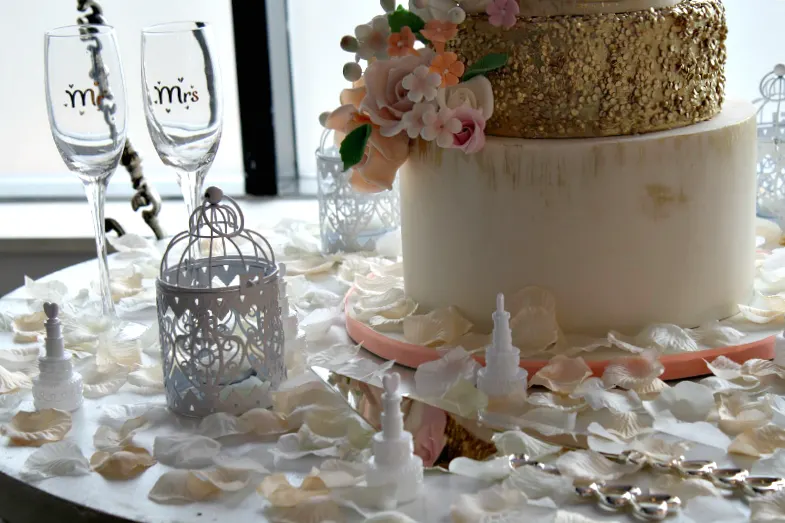When it comes to weddings, or in fact anything that’s surrounded in tradition, there’s often a lot of etiquette to follow. And it can be hard to keep up with what’s still relevant and what’s a little out of date. Even some things that have generally changed in modern etiquette might still be viewed the old-fashioned way in certain parts of the country or by certain families.
You don’t want to appear rude or offend anyone, but you also don’t want to follow conventions just because someone says you should. If you’re busy planning your wedding and everything that goes with it, here are some tips that might help you navigate etiquette in the twenty-first century.

Photo via Pixabay
Engagement Parties, Bridal Showers, and Bachelorette Parties
When you first decide to get married, you obviously want to celebrate. You might have an engagement party together with your intended, and perhaps either one or both of a bridal shower or bachelorette party.
But which ones should you have, who should host them, who should you invite and who should pay? It can all be very complicated.
First of all, you don’t have to have any of them. If you don’t feel like several parties or even one of them, it’s not a requirement. However, you might want to pick one to focus on.
There used to be rules about who should host or plan bridal showers and bachelorette parties. The former was supposed to be for family members to organize, while you maid of honor sorts out the latter.
Today, it’s usually fine for brides to organize their own shower, but it’s often still the maid of honor who at least helps with the bachelorette party.
Who’s Paying?
One of the biggest questions with weddings is who should pay. In the past, it used to be that the bride’s parents would pay the majority, if not all of the wedding costs. But today, that convention is out the window.
The bride’s parents can contribute, and so can the grooms. And in some cases, there are two brides and two grooms, so there are no gendered expectations there anyway.
Many couples plan to pay for everything on their own, without expecting a contribution from their parents. But they might get one anyway if their parents offer to give them some money or to pay for a specific part of the wedding. It’s up to you and your families what happens.
Who to Invite
Who you should invite to your wedding can seem like a tough question to answer, especially if you have family members getting involved. Your mother wants you to invite Great Aunt Gladys, and your brother wants to bring his new girlfriend.
But the short answer is that you invite whoever you want. It’s your wedding and your wedding budget, and you know how many people you can afford to invite.
Don’t waste your spaces on people you don’t really want to be there, even if there’s pressure from others to do so. If you want to let more people be part of the day, you could consider setting up a live stream or recording the ceremony.

Another thing that can complicate things is “plus ones.” When you invite someone you care about who either is single or has a partner you don’t know so well, what are the rules? If someone is married or in a long-term relationship, their partner gets to come.
If they’re single, you might extend the courtesy of a plus one, just to make sure they won’t be alone. But chances are they know other people at your wedding, so it isn’t essential.
Having a Child-free Wedding
What about not inviting any children to your wedding? Again, it’s your day, and you get to invite who you like. If you want it to be adults-only, that’s up to you. However, if you’re going to apply this rule, make sure that everyone has to follow it unless there are perhaps special circumstances.
It’s not fair if someone is told they can’t bring the kids only to turn up and see that you’ve let someone else bring theirs. Another thing to keep in mind is that if you say no kids, you have to expect that some guests might find it difficult to attend.

Wedding Gift Etiquette
Wedding gifts are often one of the most complicated things to think about when it comes to wedding etiquette. You want to avoid appearing “gift grabby” while at the same time showing your appreciation for the gifts you receive.
The first question you might ask yourself is whether you should create a registry for your wedding gifts. Is it tacky to ask for specific things? Fortunately, registries are normal, and they’re sensible too. They help to ensure you don’t end up with the same things from several different people. However, what is important is to have items for every budget on your registry.
What to Provide for Your Guests
Another big question to tackle is what you should be providing for your guests. Weddings are expensive to attend, especially if they involve travel. So if you can afford to help out your guests, it can make it easier for them to come. Obviously, you need to ensure that your guests get food and drink and that they have fun. But what about other things, like transport and accommodation?
There’s not usually an expectation that you pay for these things. However, there might be circumstances when it’s helpful. For example, you might be having a destination wedding.
Or perhaps your ceremony and reception locations are a short distance apart, or your venue is in the middle of nowhere, so your guests only have one accommodation choice.
Your Wedding Party: Who Pays for What?
Don’t forget to think about which costs for your bridesmaids and groomsmen you will take care of. If you’re expecting them to spend their own money on their outfit, accommodation, and more, it’s important to be sensitive about how much they have to spend.
What can help is giving them more control over their outfit. For example, give your bridesmaids a color and let them pick any dress they want in that color.
It’s not always easy to navigate wedding etiquette. If you want to get things right, the most important thing is to consider people’s feelings, as well as their budgets.
